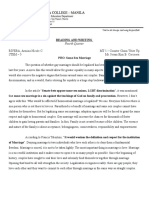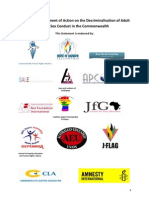Debate On Same Sex Marriage
Debate On Same Sex Marriage
Uploaded by
Julz Mortejo SalarzaCopyright:
Available Formats
Debate On Same Sex Marriage
Debate On Same Sex Marriage
Uploaded by
Julz Mortejo SalarzaOriginal Description:
Original Title
Copyright
Available Formats
Share this document
Did you find this document useful?
Is this content inappropriate?
Copyright:
Available Formats
Debate On Same Sex Marriage
Debate On Same Sex Marriage
Uploaded by
Julz Mortejo SalarzaCopyright:
Available Formats
Your honors good afternoon.
The Philippines is ranked as one of the most gay-friendly nations in
Asia. Under the survey titled The Global Divide conducted by Pew Research Center, it was shown that 73%
of adult Filipinos agreed with the statement that “homosexuality should be accepted by society” up by 9
percentage points from 64% in 2002. In Philippine history prior to Spanish occupation, Homosexuals
actually had a role of a babaylan, or a local spiritual leader who was the holder of science, arts, and
literature. In the absence of Datu of the community, the babaylans, homosexual or not, were also made
as leaders of the community. However, during the Spanish era, the Spaniards forcefully instilled the
Roman Catholicism to the natives which led to the end of acceptance of homosexuality in most of the
archipelagic people. These deep Catholic roots nationwide from the colonial era have resulted in much
discrimination, oppression, and hate crimes for the LGBT Community in the present time.
Today, most if not all LGBT members often face disadvantages in getting hired for jobs, attaining
top public positions and acquiring rights for civil marriage in this patriarchal society. History dictates that
when minority people were oppressed, discriminated and deprived of legal rights, their community
leaders would stand up and fight for their rights. During in the early part of 20th century, Filipino women
were deprived of the right to suffrage, property rights during marriage and were succumbed to the whims
and caprices of their husbands. Today, much has been changed, an overhaul to the system which resulted
to the rise of women in various sectors in the political atmosphere, business industry and in the legal field.
Now, if we could give equal rights for women, why not for LGBT brothers and sisters?
The negative argues that by granting same-sex marriage to the LGBT community would not be
beneficial since it would affect our traditions, norms, mores and even the law. Today I would like to discuss
the 3 reasons on why granting same sex marriage is beneficial.
First, the legalization of same sex marriage would grant the couples the benefits on which the
government would give to heterosexual couples. The said benefits would entail that the
government recognizes the importance of the minority group. Under the taxation law,
heterosexual couples could claim benefits in the form of additional exemptions for their children,
and married couples are required to file their income taxes together to save the BIR’s time in
dealing with income taxes of individuals.
Should we legalize the same-sex marriage, such benefits would also be applicable to our LGBT
brothers and sisters as a form of incentives for being a tax payer in the country. Furthermore,
once legally married, the same sex couples will be eligible for government services, and security
service death benefits under SSS, GSIS or veterans benefits and pensions. In case of death of the
member spouse, the surviving spouse will be entitled to receive portion of monthly pension
entitled to the deceased spouse.
Second, by legalizing same sex marriage, this opens the opportunity to the LGBT members to
legally adopt children of their own. Currently, though the Philippine law allows and LGBT member
to adopt a child, they can do so individually and not jointly as a couple. With this rule, this creates
a subtle discriminatory barrier for the members of the LGBT in starting a family of their own.
Article 15 section 1 of the Philippine Constitution provides that “the State recognizes the
Filipino family as the foundation of the nation. Accordingly, it shall strengthen its solidarity and
actively promote its total development.”
Article 15 section 3 provides further that “the right of the children to assistance, including
proper care and nutrition, and special protection from all forms of neglect, abuse, cruelty,
exploitation, and other conditions prejudicial to their development”
By these aforementioned articles, nowhere in the Constitution prohibits gay couples to
become parents of an adopted child and certainly they cannot be construed against the gay
couples to inhibit them from becoming an effective basic unit of the society. Furthermore,
research from American Psychological Association coined the term “no differences theory” which
posits that there is no scientific evidence that parenting effectiveness is related to parental sexual
orientations; that gay couples are as likely as heterosexual parents to provide supportive and
healthy environments for their children and that the adjustment, development, and psychological
wellbeing of children is unrelated to the said parental sexual orientations.
Lastly, the legalization of same sex marriage would lessen the discriminatory biases against the
LGBT members. In affirming the rights of a social minority such as the LGBT community, we are
also opening the way for other cultural, political or any other minority group. Just as
acknowledging racial equality, it lessens the misogynistic approach towards women and the rise
of women empowerment and feminism, and a genuine gay liberation can in turn spawn liberation
trends that can make our society a more stable one.
Furthermore, acknowledging the legality of homosexual relationships by allowing them to
marry reduces homophobia and violence against the community. The LGBT community also has
heterosexual allies that can be subjected to discriminatory violence in places where same sex
marriage is illegal. The stigma associated with homosexuals and those that support them will
reduce gradually if same sex marriage is legalized. By normalizing the nature of same sex
relationships, we are creating a society that is more accepting, more diverse, and in effect, more
democratic. Moreover, the rights afforded to the LGBT community are enshrined in the UN
Charter, the Universal declaration of human rights which declares that “all human beings are born
free and equal in dignity and rights, that the equality and non-discrimination guarantee provided
by the international law applies to all people, regardless of sex, sexual orientation, gender identity
and other status.
With these contentions, the affirmative is firm in our stand and that the negative should admit
that their approach in this issue is rhetoric rather than pragmatic which are not practicable in resolution
of the case at bar. After all, the granting of same sex marriage is not only for the satisfaction of the few
but also for the society as a whole. Idealistic it may seem, but a society so diverse yet living in harmony is
better than a society instilling hate, discrimination and oppression.
You might also like
- Same Sex Marriage-NegativeDocument3 pagesSame Sex Marriage-NegativeJean Monique Oabel-Tolentino94% (16)
- DebateDocument2 pagesDebatekumiko sakamotoNo ratings yet
- Same-Sex Marriage ThesisDocument31 pagesSame-Sex Marriage ThesisMaricar Bautista89% (74)
- Same Sex Marriage in The PhilippinesDocument4 pagesSame Sex Marriage in The PhilippinesMichael Angelo Seña60% (15)
- Affirmative Same Sex Marriage ArgumentsDocument2 pagesAffirmative Same Sex Marriage Argumentsglaize58786% (14)
- A Position Paper About Same Sex MarriageDocument7 pagesA Position Paper About Same Sex MarriageYsrael Delas Alas0% (1)
- Essay Same Sex MarriageDocument1 pageEssay Same Sex MarriageErbert Medellin89% (19)
- Position Paper On Same Sex Marriage in The PhilippinesDocument3 pagesPosition Paper On Same Sex Marriage in The PhilippinesAlicia Abby Ann Ang75% (4)
- Position Paper of LGBTDocument1 pagePosition Paper of LGBTMohd Rashad Fatein A. Raquib100% (20)
- Position Paper Abella & Efipania MacayaDocument8 pagesPosition Paper Abella & Efipania MacayaJulz Mortejo SalarzaNo ratings yet
- Donald Hilton Address PornographyDocument24 pagesDonald Hilton Address Pornographyda5idnzNo ratings yet
- Same Sex MarriageDocument5 pagesSame Sex MarriageredhotmommahNo ratings yet
- Same Sex Marriage (Negative)Document3 pagesSame Sex Marriage (Negative)carlos codizal80% (5)
- A Human Right and A Civil Right As Well As A Political, Social, and Religious IssueDocument4 pagesA Human Right and A Civil Right As Well As A Political, Social, and Religious IssueGabrielle May LacsamanaNo ratings yet
- The Right To MarryDocument3 pagesThe Right To MarryCielo Amor RabangNo ratings yet
- Oral Argument-Section B-Group 12 - Legal Technique and LogicDocument15 pagesOral Argument-Section B-Group 12 - Legal Technique and LogicShawn GonzalesNo ratings yet
- LTL Should We Allow Same Sex MarriageDocument2 pagesLTL Should We Allow Same Sex MarriageCess Bustamante AdrianoNo ratings yet
- Legalizing of Same-Sex Marriage in The PhilippinesDocument8 pagesLegalizing of Same-Sex Marriage in The Philippinesdanieljudee100% (2)
- Position Paper (EAPP)Document2 pagesPosition Paper (EAPP)LYLE ROANo ratings yet
- Same Sex MarriageDocument2 pagesSame Sex MarriageEdli Ane AnchetaNo ratings yet
- Legalizing Same Sex Marriage in The Philippines - FinalDocument7 pagesLegalizing Same Sex Marriage in The Philippines - FinalGlenn Gonzales100% (2)
- Negative Speaker Same Sex MarriageDocument3 pagesNegative Speaker Same Sex MarriageEmerson Biclar Golipardo77% (22)
- Debate Speech - Same Sex MarriageDocument2 pagesDebate Speech - Same Sex MarriageZhairah Hassan100% (3)
- Same Sex Marriage in The PhilippinesDocument2 pagesSame Sex Marriage in The PhilippinesAedreanne Nicole100% (1)
- Same Sex MarriageDocument3 pagesSame Sex MarriageMohd Rashad Fatein A. Raquib100% (1)
- Negative Second SpeakerDocument2 pagesNegative Second SpeakerAnonymous B0hmWBT90% (29)
- Same Sex MarriageDocument3 pagesSame Sex MarriageRica Pearl Hernan Buta100% (1)
- Should Same Sex Marriage Be Allowed in The PhilippinesDocument1 pageShould Same Sex Marriage Be Allowed in The PhilippinesBryan Balagan100% (6)
- Legalization of Same Sex Marriage in The PhilippinesDocument6 pagesLegalization of Same Sex Marriage in The PhilippinesNicole Mansueto100% (1)
- Gay Marriage ProConDocument4 pagesGay Marriage ProConHumidStingNo ratings yet
- Legalization of Same Sex Marriage in The Philippines 1Document3 pagesLegalization of Same Sex Marriage in The Philippines 1Jhoy Periña BasNo ratings yet
- Same Sex Marriage Pros ConsDocument2 pagesSame Sex Marriage Pros ConsCyrine CalagosNo ratings yet
- Debate Same Sex MarriageDocument14 pagesDebate Same Sex MarriageSri ParwatiNo ratings yet
- Argumentative Essay On Same Sex MarriageDocument4 pagesArgumentative Essay On Same Sex MarriageKAREEM WAHEEDNo ratings yet
- Negative Side of Same Sex MarriageDocument4 pagesNegative Side of Same Sex MarriageDaryl Homer SisonNo ratings yet
- Legalization of Same Sex Marriage in The PhilippinesDocument3 pagesLegalization of Same Sex Marriage in The PhilippinesKenneth Ballon100% (1)
- Legalizing Same Sex Marriage in The PhilippinesDocument2 pagesLegalizing Same Sex Marriage in The PhilippinesLaryze Lozano100% (2)
- SAME SEX MARIAGE Position PaperDocument6 pagesSAME SEX MARIAGE Position PaperMybaby Skrrtt100% (1)
- Same Sex Marriage Position PaperDocument7 pagesSame Sex Marriage Position PaperCrisven GuilleroNo ratings yet
- Position PaperDocument3 pagesPosition PaperDonna ZapateroNo ratings yet
- Eapp-Position PaperDocument4 pagesEapp-Position Paperangeligaleno50% (2)
- Pros and Cons of Same Sex MarriageDocument5 pagesPros and Cons of Same Sex MarriageAnnie Faulve Ondillo-NaoeNo ratings yet
- Legalization of Same-Sex Marriage in The PhilippinesDocument8 pagesLegalization of Same-Sex Marriage in The Philippinesdanieljudee100% (1)
- Position Paper On Same Sex Marriage.Document3 pagesPosition Paper On Same Sex Marriage.Gwenn Althea ValenciaNo ratings yet
- Legalization of Same Sex Marriage in The PhilippinesDocument3 pagesLegalization of Same Sex Marriage in The PhilippinesMoses MañaraNo ratings yet
- Argumentative EssayDocument2 pagesArgumentative EssayRadjien Kyla DetablanNo ratings yet
- Same Sex Marriage PaperDocument9 pagesSame Sex Marriage PaperNiah Brown100% (1)
- Same Sex Marriage Position PaperDocument6 pagesSame Sex Marriage Position Paperapi-27383908489% (47)
- Same Sex MarriageDocument2 pagesSame Sex MarriageChristian Guimban100% (2)
- SAME SEX MarriageDocument3 pagesSAME SEX MarriageMarivic Asilo Zacarias-Lozano100% (1)
- Same Sex Marriage Pro ConDocument2 pagesSame Sex Marriage Pro ConSofia AlcatracesNo ratings yet
- Position Paper Same Sex MarriageDocument2 pagesPosition Paper Same Sex MarriageRejane CustodioNo ratings yet
- Same-Sex Marriage - Position PaperDocument3 pagesSame-Sex Marriage - Position Paperrodel tagaoNo ratings yet
- I Am Favor of Same Sex Marriage in The Philippines Primarily Because This Is A Right of Every Filipino LGBTDocument5 pagesI Am Favor of Same Sex Marriage in The Philippines Primarily Because This Is A Right of Every Filipino LGBTIsang Way GapanibinNo ratings yet
- Divorce Should Be Legalized in The PhilippinesDocument12 pagesDivorce Should Be Legalized in The PhilippinesRyan Eugenio72% (18)
- Affirmative Second SpeakerDocument2 pagesAffirmative Second SpeakerAnonymous B0hmWBT82% (11)
- Position Paper On DivorceDocument8 pagesPosition Paper On DivorceRoland Joseph Mendoza100% (4)
- Legalization of Same Sex Marriage in The PhilippinesDocument2 pagesLegalization of Same Sex Marriage in The PhilippinesAnn Catherine Ecita100% (2)
- Counter Claim ArticleDocument2 pagesCounter Claim ArticleStem Five100% (1)
- Embracing Equality Advocating For The Implementation of SameDocument3 pagesEmbracing Equality Advocating For The Implementation of Samers3000433No ratings yet
- Social and Religious Influence in The PhilippinesDocument7 pagesSocial and Religious Influence in The PhilippinesKatherine NovelaNo ratings yet
- LESSON 2-ETHICS-WPS OfficeDocument3 pagesLESSON 2-ETHICS-WPS OfficeRichie EscoltaNo ratings yet
- Bar Probables Obligations and ContractsDocument87 pagesBar Probables Obligations and ContractsJulz Mortejo SalarzaNo ratings yet
- Eeehuq: Itinerary ReceiptDocument6 pagesEeehuq: Itinerary ReceiptJulz Mortejo SalarzaNo ratings yet
- Sec. 3, Domestic Workers Act. Sec. 4 (D), Ibid. IbidDocument11 pagesSec. 3, Domestic Workers Act. Sec. 4 (D), Ibid. IbidJulz Mortejo SalarzaNo ratings yet
- Sec. 3, Domestic Workers Act. Sec. 4 (D), Ibid. IbidDocument11 pagesSec. 3, Domestic Workers Act. Sec. 4 (D), Ibid. IbidJulz Mortejo SalarzaNo ratings yet
- Provrem Cases 4.5.19Document47 pagesProvrem Cases 4.5.19Julz Mortejo SalarzaNo ratings yet
- LBP Claim No.: Baba, Reynelda K. Ilaya, Glan, Sarangani ProvinceDocument1 pageLBP Claim No.: Baba, Reynelda K. Ilaya, Glan, Sarangani ProvinceJulz Mortejo SalarzaNo ratings yet
- ADR Resci Notes 2012Document59 pagesADR Resci Notes 2012Julz Mortejo SalarzaNo ratings yet
- 4th Set of Cases ObliDocument13 pages4th Set of Cases ObliJulz Mortejo SalarzaNo ratings yet
- Public Corporation 2012Document77 pagesPublic Corporation 2012Julz Mortejo SalarzaNo ratings yet
- Timer/Coinslot/Headset/Mouse/ Keyboard/Speaker Timer/Coinslot/Headset/Mouse/ Keyboard/SpeakerDocument1 pageTimer/Coinslot/Headset/Mouse/ Keyboard/Speaker Timer/Coinslot/Headset/Mouse/ Keyboard/SpeakerJulz Mortejo SalarzaNo ratings yet
- Air France Vs Saks DigestDocument1 pageAir France Vs Saks DigestJulz Mortejo Salarza100% (1)
- Security Bank vs. CuencaDocument9 pagesSecurity Bank vs. CuencaJulz Mortejo SalarzaNo ratings yet
- Between The Lines 2126Document40 pagesBetween The Lines 2126ECMasseyNo ratings yet
- GE Elect 2 Lesson 1Document6 pagesGE Elect 2 Lesson 1Krystalline ParkNo ratings yet
- Display of Affection: Perception of FilipinosDocument2 pagesDisplay of Affection: Perception of Filipinosvince barroNo ratings yet
- Erinyes Submission To Australian Human Rights CommissionDocument52 pagesErinyes Submission To Australian Human Rights CommissionZoe Ellen BrainNo ratings yet
- Pengkid Lesbians StudiesDocument15 pagesPengkid Lesbians Studiesมา ยาNo ratings yet
- This Study Resource WasDocument3 pagesThis Study Resource Wasjaja riveraNo ratings yet
- Human SexualityDocument22 pagesHuman SexualityAngeli VillarNo ratings yet
- BibliographyDocument11 pagesBibliographyChem R. PantorillaNo ratings yet
- Lavender Issue 419Document84 pagesLavender Issue 419Lavender Magazine100% (1)
- Wilson - Petrarch's Queer HistoryDocument26 pagesWilson - Petrarch's Queer HistoryalexfelipebNo ratings yet
- Background Guide - Commonwealth of NationsDocument13 pagesBackground Guide - Commonwealth of NationsBBPSMUNNo ratings yet
- Where There Is No Doctor A Village Health Care HanDocument5 pagesWhere There Is No Doctor A Village Health Care HanKiGRAPHIX DesignerNo ratings yet
- Same Sex Marriage Amicus Brief 9th Circuit PDFDocument41 pagesSame Sex Marriage Amicus Brief 9th Circuit PDFJimmy W GreenNo ratings yet
- Pedo Reagan ArticleDocument6 pagesPedo Reagan Articlenemesis26ooNo ratings yet
- 2022 Article 2315Document12 pages2022 Article 2315Camilo PaezdelahozNo ratings yet
- A Research On Homosexuality and Pedophilia The Same Evil Just A Different Name - Khidr AmariDocument30 pagesA Research On Homosexuality and Pedophilia The Same Evil Just A Different Name - Khidr AmariDr. Momin Sohil100% (2)
- Fahs.B.2010a.radical Refusals On The Anarchist Politics of Women Choosing AsexualityDocument18 pagesFahs.B.2010a.radical Refusals On The Anarchist Politics of Women Choosing AsexualityJinsun YangNo ratings yet
- Settlement of Newcomers To Canada Fall 2010Document224 pagesSettlement of Newcomers To Canada Fall 2010waciy70505No ratings yet
- Joslin vs. New ZealandDocument14 pagesJoslin vs. New ZealandNessalyn Mae Rosales ValenciaNo ratings yet
- Gender Role: Kenth Joel CardenteDocument7 pagesGender Role: Kenth Joel CardenteKenth Joel CardenteNo ratings yet
- Group 7Document19 pagesGroup 7Samonte, KimNo ratings yet
- Am I Screaming and Do Not Know It by Stephen MeadDocument10 pagesAm I Screaming and Do Not Know It by Stephen MeadStephen MeadNo ratings yet
- Masculinity and Feminity, SOGIE, and Gender StereotypeDocument7 pagesMasculinity and Feminity, SOGIE, and Gender StereotypeLiezl AscarezNo ratings yet
- Civil Society Statement of Action On The Decriminalisation of Adult Same Sex Conduct in The CommonwealthDocument6 pagesCivil Society Statement of Action On The Decriminalisation of Adult Same Sex Conduct in The CommonwealthLGBT Asylum NewsNo ratings yet
- Banned BooksDocument7 pagesBanned Booksapi-457501806No ratings yet
- The Modern Model Family at Home in SingaporeDocument14 pagesThe Modern Model Family at Home in Singaporexiaoxiaohua42No ratings yet
- LGBT Groups in Eastern and Western SocietiesDocument10 pagesLGBT Groups in Eastern and Western SocietiesAaleeahNo ratings yet
- What Do Women WantDocument15 pagesWhat Do Women WantIain Cowie100% (1)
- Wiesner-Hanks, Merry E. Gendered World HistoryDocument27 pagesWiesner-Hanks, Merry E. Gendered World HistoryHenrique Espada LimaNo ratings yet





































































































